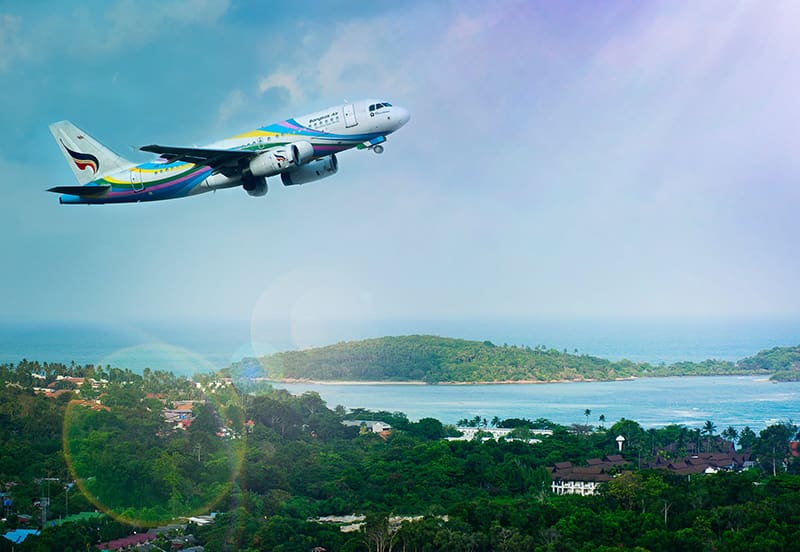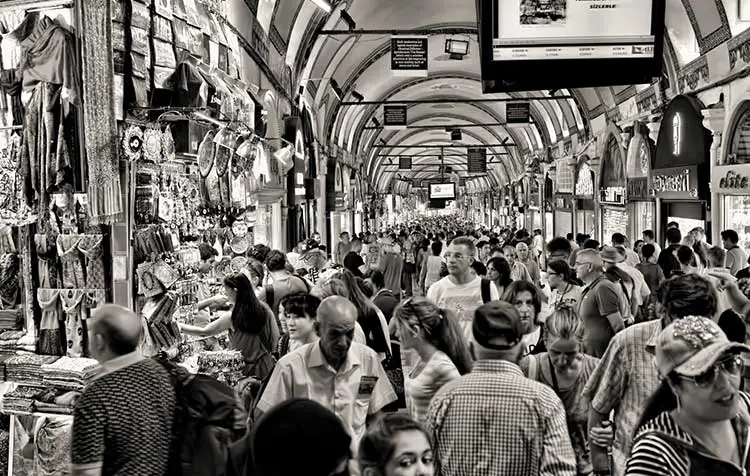What is mass tourism? Are you asking yourself this question or do you simply want to know more about this form of vacation? Then you've come to the right place. More and more people are booking well-planned trips from tour operators, where they can sit back, relax, and take organized tours to see the biggest tourist hotspots at their vacation destination. However, since mass tourism has serious consequences for our environment, economy and the local population at the vacation destinations - and I would like to contribute to the solution of these problems - I have dived deeper into the matter.
In this article, you will now learn what mass tourism means, what causes it and what effects it has. Of course, you will also learn which form of tourism can solve the problems - and how you can become part of the solution.
Mass tourism - what is it?
In the dictionary, the term mass tourism (also called overtourism) is translated as "large-scale tourism for broad sections of the population"To put it casually, mass tourism means a large number of travelers in one place. In this form of tourism, a large part of the planning is taken over by the tourism providers, so that vacationers supposedly do not have to worry about the activities at the destination. It is then also not necessary to adapt too much to the local conditions.
Difference from package tourism? Package tours are trips in which a vacationer takes at least two types of travel services (e.g., flight and accommodation) from one tour operator. Thus, package tourism is in principle the breeding ground for mass tourism.
Features of mass tourism
Here you will find some typical features by which you can recognize this form of travel quite quickly:
- Large crowds in tourist hotspots
- Cheap, well organized vacation
- All-inclusive offers
- Hardly any foreign language skills required
- Increased party
- Good transport infrastructure (with airport and developed road network)
- Found mainly at seaside resorts
- Many hotels close to the beach
- High occupancy rate of hotels
- Crowded beaches
Advantages and disadvantages
In the next step, I looked at the respective merits and criticisms of mass tourism. After all, there must be reasons why so many people decide for or even consciously against this form of vacation. You will also get some examples of this.
Advantages
- Cheap vacation offers
- Large, diverse range of leisure activities
- No foreign language skills necessary
- Vacationers do not have to worry about the organization
- Tourism industry creates many jobs
Disadvantages
- High resource consumption for tourists
- Pollution
- Destruction of the landscape
- Air traffic increases drastically
- Harassment of locals by noise and bad behavior
- Exploitation of animals and minors
- Jobs in the industry are mostly only seasonal
- Revenues often flow to international tourism groups
- Basically no unique experiences are possible
Can you think of any other pros and cons? Then just write me your hint under this post.
Mass tourism statistics
Here are some facts and figures about mass tourism for you:
- Germans take around 70 million vacation trips per year.₂
- In 1950, there were still around 25 million travel arrivals worldwide. By 2017, this figure had already risen to 1.33 billion.₃
- In 2014, around 21 million people were traveling on cruise ships worldwide - producing 32 liters of wastewater per person every day.₄
Tip: At Tourism statistics you will find many more meaningful facts and figures about the tourism industry. If you have your own additional suggestions, just write me a comment with the corresponding source.
Causes of mass tourism
The advantages and disadvantages are now clear. But what are actually the reasons for the growing, mass tourism market? Here you will find some of the basic causes:
- Growing prosperity
- Rising world population
- Falling costs for air travel₅
- Increasing free time
- Global networking / social change
- Emergence of a tourism industry
- Growing motorization
- Political and economic liberalization
Effects of mass tourism

Mass tourism affects the environment as well as the economy and culture of the local population of the destination. Now, therefore, we should look at the reasons for replacing this type of travel with sustainable alternatives as soon as possible.
Ecological consequences
How does mass tourism actually affect our environment? Here I have compiled and explained some problem points:
- Plastic waste in the sea: Maybe you have already heard about the gigantic Garbage vortices in the world's oceans belongs. The behavior of tourists in beach regions makes a decisive contribution to this. The more people, the greater the environmental impact of litter. More at Plastic waste in the environment.
- Animal suffering: On the one hand, mass tourism leads to animal suffering due to the garbage in the environment. Turtles and especially marine bird species, for example, take the plastic waste for food or strangle themselves on it. But also elephant rides and other "tourist attractions" with animals cause physical and especially psychological animal suffering.
- Climate change: The tourism industry accounts for 5 percent of global greenhouse gas emissions.₆ Flights in particular, but also car trips, emit massive amounts of CO2 off. A greenhouse gas that global warming amplifies and brings further problems with it.
- Soil degradation: The infrastructural development with roads, or also the stringing together of mighty hotels provide for an increasing soil sealing at the destination, which in turn result in landscape changes. You can learn more in the Soil erosion contribution.
- Water scarcity: The change in the soils also results in the sinking of groundwater. However, mass tourism also ensures enormous water consumption through large swimming pools or extensive irrigation-intensive hotel complexes - and Water shortage of the local population.
Social consequences
When different cultures clash, the potential for conflict is generally quite high - for example, noise pollution from tourists. But the Quality of life of the local population suffers especially under mass tourism, when the revenues flow to international tourism corporations and remain locally. The greater the local dependence on tourism, the harder it hits the people.
I would also like to say a few words about the violation of human rights in mass tourism, which are often trampled underfoot. Mass tourism can also affect completely uninvolved people. For example, when coastal areas are destroyed for tourist facilities and fishermen lose their jobs. In addition, many people travel abroad specifically to have sex (often with minors). Sex tourism is a part of mass tourism to be despised.
Economic consequences
The result of organized mass tourism is that international companies, in particular, cash in. There is hardly any money left over for the local population in this fast-paced form of travel. This is due, for example, to the fact that the regional supply in underdeveloped countries is usually insufficientto create a powerful travel destination from scratch in a short period of time. But also the Holidaymaker habits, for example, to dine in American Fastford chains rather than the local curry house even in India, contributes a crucial part to the economic impact of mass tourism.
What to do against mass tourism?

If people and the environment end up suffering from the effects of mass tourism, solutions should be found as soon as possible. This is quite easy to say when this form of travel brings many disadvantages but yes also some advantages. But fortunately, with soft tourism, a sustainable form of tourism has been found, which in combination with an environmentally and socially responsible attitude on our part creates change.
Soft tourism
Call this type of tourism what you will: "Green Traveling" "Nature-based Traveling" "Sustainable Tourism" - or even "Gentle Tourism". What is meant by this is a decelerated type of travel that defies the growing prosperity, the growing world population and the growing urge to explore the world. It is characterized above all by the goal of preserving the natural landscape, adapted, intensive travel experiences, and the targeted promotion of the local population.
Here are Some features, which characterize the soft tourism.
- Limited number of tourists
- No hotels of big chains
- Low foreign exchange outflow to international groups
- Networking of businesses with other local businesses
- Fair wages and career prospects
Soft tourism is for long-term sustainable development in the areas of environment, economy and society. Mass tourism is the opposite. The duel between mass tourism and soft tourism is therefore won by the future-oriented, decelerated form of travel.
Sustainable travel
The question "What to do against mass tourism?" I could now also simply plump with "no longer book mass tourism trips" answered. Done - end of the article. But since there are ultimately good reasons for booking these travel offers, I would like to give you here above all again a few pieces of advice with which you can make your vacation more sustainable.
- Healthy ratio between travel distance and travel duration: For example, don't fly to Bali and back for that week-long beach vacation.
- Stay on site for one week per hour of flight time: This is what WWF Switzerland recommends as a rule of thumb to counteract the growing number of air travel bookings.₇
- Consciously support the local population: Eat at local restaurants, book tours with locals and stay with locals. For example in private accommodation About Airbnb or in eco lodges over bookitgreen. Avoid convenient package deals.
- Get involved with the local people and travel slower: In mass tourism, there is usually no time for a personal, cultural exchange with locals. Therefore, shift down a gear and try to consciously get to know the people and culture at your destination.
- Reduce your resource consumption in a targeted way: Whether it's air conditioning, flushing toilets, or taking a shower every day, consciously try to conserve resources like electricity and water. If you imagine that you would have to pay for them yourself, it helps immensely.
By the way, you can get even more tips in the detailed article about the sustainable travel. You will certainly not find real and unique experiences in organized mass tourism. Therefore, it is mainly up to your personal attitude, how unique your vacation will be in the end.
Will mass tourism come to an end?

Let's hope so - because it has to decrease, so that we can above all Environmental problems of our time can solve together. But the chances are good, despite the growing world population. After all, mass tourism exists not only because of the growing world population, low prices and the low need for vacationers to organize. It also exists because it is concentrated on just a few extremely popular main destinations such as Paris or Bangkok. If we can solve this distribution problem of tourists and educate our global society for the environmental, economic and social impacts of mass tourism, I am positive for the future.
What do you think about mass tourism? Do you have any questions or even your own experiences that you would like to share? Then feel free to write a comment.
Stay clean,

PS.: In the Nature travel blog you will find a lot of inspiring and sustainable alternatives to mass tourism. By the way, also about the activities on site: Take a look for example at the article about the Collect garbage on vacation inside.
References:
₁ Bibliographisches Institut GmbH (Duden-Verlag): Mass tourism, available at https://www.duden.de/rechtschreibung/Massentourismus. [12.03.2020].
₂,₄ WWF Germany: Environmental pollution through tourism? Better to travel sustainably! | WWF Germany. YouTube, 28.07.2016, Web, 10.03.2020 at 21:50, in: https://www.youtube.com/watch?v=hrtvGoi0THY.
₃ Statista GmbH: Worldwide tourism volume by number of travel arrivals from 1950 to 2019 (as of January 2020). https://de.statista.com/statistik/daten/studie/37123/umfrage/weltweites-tourismusaufkommen-nach-reiseankuenften-seit-1950. [03/10/2020].
₅ Statista GmbH: Overtourism (as of 2019). https://de.statista.com/statistik/studie/id/67364/dokument/overtourism. [10.03.2020].
₆ WWF Germany: Overfishing: Sustainability in tourism - Your vacation and climate change (as at: 08.12.2016). https://www.wwf.de/aktiv-werden/tipps-fuer-den-alltag/umweltvertraeglich-reisen/tourismus-und-klimawandel. [10.03.2020].
₇ WWF Switzerland: Swiss stay grounded for climate (as at: 17.06.2019). https://www.wwf.ch/de/medien/schweizer-bleiben-am-boden-fuers-klima. [10.03.2020].







We had homework in geography on and this site is just gold my friend was also on this site and is satisfied LG
Hi Joha! I am very happy if I could help you! Best regards, Christoph
I am writing my term paper on tourism in Veneidg. this site is gold for me! Thank you, thank you, thank you!
Hey Denise! Danke dir für dein Feedback! Freut mich wenn ich dir helfen konnte 🙂
Good luck and best regards
Christoph
Comments are closed.